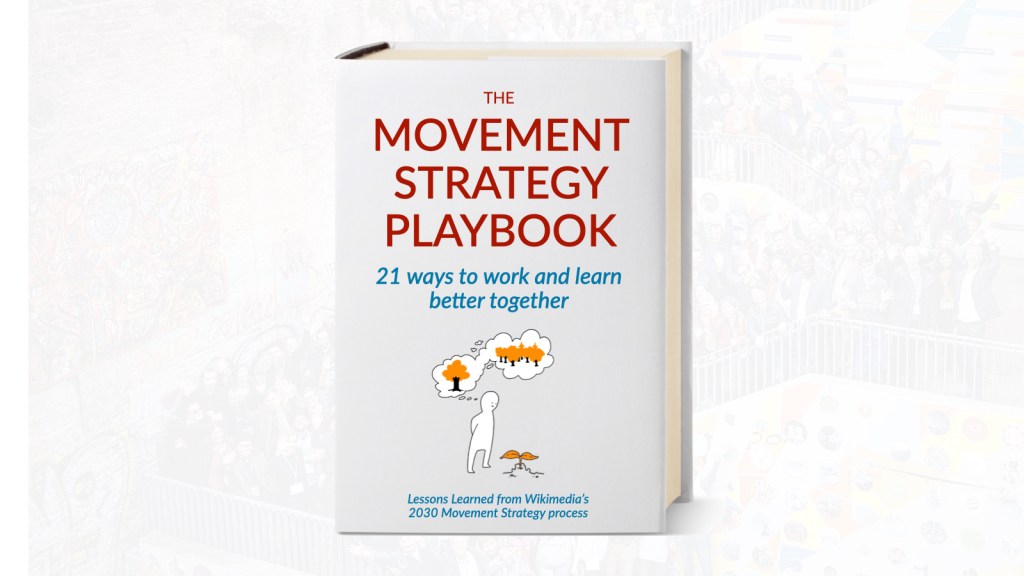
Wikimedia’s 2030 Movement Strategy is an ambitious vision and plan for Wikipedia’s future — and the culmination of more than three years of work from 2,000+ volunteers spread across 50 countries. As part of a series of interviews and group listening sessions to gather lessons learned from this unprecedented global process, we wanted to understand what motivated these busy volunteers to get involved.
So we asked them: what inspired you to get involved with Movement Strategy? Why does something abstract like “strategy” matter to you? Our hope is that understanding the deeper meaning and motivation for participants can help inform the next phase of Movement Strategy’s work, which includes important milestones like a Movement Charter, Global Council and more.
Participants’ answers were surprising and diverse, from the desire to build relationships, learning and career skills to addressing safety and harassment concerns, tackling regional challenges, and protecting Wikipedia’s future. (You can read a full summary of their answers here in The Movement Strategy Playbook.)

Some of the reasons participants gave:
- Relationships. “To work with amazing people who are all so committed to Wikimedia.”
- Learning. “To get new inspiration and to learn.”
- Gathering diverse perspectives. “Bringing together people from different modes of Wikimedia activity and locations.”
- Preparing for the future. “In 2030, who knows what the internet will look like, or if Wikipedia will still be as relevant as it is today?”
- Addressing safety and harassment issues. “I was motivated by the experience of harassment from other Wikipedians/ Wikimedians.”
- Empowering emerging communities. “It feels like small / emerging African communities are often left behind in the Wikimedia Foundation in areas like decision making and policy-making.”
- Career development. “I became involved because of the opportunity to build myself professionally. I started off as an editor, and the user group gave me the opportunity to learn fast.”
- Tackling specific challenges. “There are a lot of things not covered in the mainstream papers — in LGBTQ communities, for example, or African-American issues. Things that would not qualify for current English rules for eligibility on Wikipedia. I want to find ways to navigate around that.”
- Democratizing information. “[Wikipedia] is one of the most democratized platforms for information in the world right now.”

The desire to create a true global movement, versus disconnected parts
Many participants spoke to the opportunity of making Wikimedia a true “movement” in a meaningful sense, rather than just a loose collection of parts.
“We call ourselves a movement, but really right now we’re a hodgepodge or collection of communities,” one participant told us. “We share a similar mission, but are not super connected across countries and languages and projects.”
“Having a common strategy and structural reforms could move us towards connecting globally, sharing capacities and supporting peers across the globe. To me that was such a fascinating vision.”
Addressing key challenges and pain points
Other participants cited recurring pain points and challenges for the movement, and the need for a clearer overarching vision and strategy. “When you think about it, all of the big current challenges for the Wiki movement tie back to strategy in some way,” another participant told us. “The Universal Code of Conduct, API, Brand, etc — all of those touch on fundamental questions of who we are, and where we’re going.”

Ensuring Wikipedia’s survival
Others spoke to the need for ensuring Wikipedia’s ongoing relevance as the world and the web evolve. “In 2030, who knows what the internet will look like, or if Wikipedia will still be as relevant as it is today?”
Many connected the dots between participating in movement strategy and the world’s unique present moment — on issues like pandemic, the politicization of “truth,” and systemic racism.
“Right now, there is such an over-politicization of everything; even a global virus or disease are political events now. The work that we’re trying to do with Movement Strategy is so important, because if we don’t include people in representing their own voices and perspectives, someone else will write that story for them. That is the history of history.”
Others spoke to the importance of diversifying the Wikimedia movement. “For me, the movement strategy work connects to everything else that is happening in the world right now around being good allies to marginalized and less privileged communities.”
“Diversity and inclusion is a matter of survival, and of our movement staying relevant in this work. This is a chance to become something that makes an impact in the world, and to become more relevant to the survival of the human race.”
What motivated you to get involved in Movement Strategy?
Or if you haven’t jumped in yet: what would inspired you to get involved? We’d love to hear from you about how we might make Movement Strategy more relevant to your day-to-day work, the issues you care about most, or advice on clarifying the “why” behind getting involved in collective strategy.

Can you help us translate this article?
In order for this article to reach as many people as possible we would like your help. Can you translate this article to get the message out?
Start translation